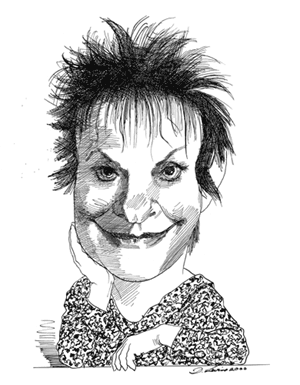There are many pleasures to Diane Johnson’s new cultural comedy, Le Mariage. It is serious, intelligent, witty, sporting, and even touching. But perhaps the most welcome pleasure of them all is that, like some dashingly sophisticated aunt from the big city, this novel is utterly charming.
Le Mariage is the second chronicle of Diane Johnson’s expatriate Americans muddling their earnest ways through the grace and strict sensual beauty of Paris. Like Le Divorce before it, Le Mariage exposes the exquisite cultural absurdities that appear when Americans and French people are stirred together, around and around, elbow to elbow, in the same little social cup. Johnson’s last novel began with the breakup of the marriage of a young American poet and her husband, a philandering French painter. Le Mariage catalogs the hopes, misunderstandings, and disappointments of two marriages, one on its last legs, the other still picking out its trousseau.
Clara Holly, a thirty-two-year-old expatriate of startling beauty, is a long-retired ingenue married to Serge Cray, the famous Polish director of her first, and only, film (and a character with a strong resemblance to Stanley Kubrick, Johnson’s friend for whom she wrote the screenplay of The Shining). Cray is now in the ninth year of his artistic paralysis. The Crays live outside Paris in a big château which they have meticulously restored, using carpenters and props from Serge’s last film, Queen Caroline. “Had she married in bad faith,” Clara asks herself, “for conventional reasons like pregnancy, or because he was famous, which is easy to confuse with love?” Whatever the reason, she has grown comfortable with her life in France. “Clara Holly remembered her roots,” Johnson tells us, “yet would rather not….” The root in question lives on in Lake Oswego, Oregon. “‘There’s nine hours’ time difference between here and France,’ Mrs. Holly would always add, it being so odd to think of Clara all the way on the other side of the world where it was dark when the sun shone in Oregon.”
Clara receives a telephone call from a tourist visiting from Lake Oswego. The girl, Delia, has had her passport stolen on her first day in Paris. On her second day, she and her traveling companion discover a man with his throat cut. Superior to the barbarian natives, horrified by a brasserie called Le Bon Tabac (“In Oregon you would instantly go out of business if you called a restaurant The Good Tobacco”), Delia, a millennial extremist who goes to the Louvre to soak up the healing powers of the pyramid, is the ultimate hapless tourist, and Clara feels a duty to take her in until the French police clear things up, noting with some equanimity that “at least…self-pity has the merit that it is apt to be sincere.” Serge, a collector of apocalyptic manuscripts who imagines America “as a nation of right-wing revolt, made up of desperado school boards, subversive Boy Scout troops, renegade Chambers of Commerce, Lions Clubs and Elks secretly arming,” welcomes Delia as a new source of material for his script. He is so inspired he calls the studio and begins lining up the helicopters and stunt men.
Johnson sprinkles the novel with McGuffins as if they were spices. Besides a murder, Le Mariage offers a medieval apocalyptic manuscript stolen from the Morgan Library just at the time Delia leaves the country, an apocalyptic right-wing extremist plot based in Oregon, and a dispute over blood sports and French national monuments that threatens to turn into an international incident. More or less amusing on their own, they blend together to create the satisfying aroma, if not the full flavor, of suspense. They also serve to bring Clara, Serge, and Delia together with Tim Nolinger, an American journalist (he’s half-American, but he might as well be 100 percent: his mother is Belgian and plays golf), and Anne-Sophie d’Argel, Tim’s French fiancée. Good-natured, well-mannered, and lacking all ambition, Tim is a stringer, a little long in the tooth for such a rootless job, who hangs out in Europe writing a little of this for a left-wing newspaper, a little of that for a right-wing magazine.
Anne-Sophie, though she is a sophisticated business woman who runs an antiques stall in the flea market, has something of the naif about her. She is burdened with a well-known novelist for a mother and
Anne-Sophie had from her novelist mother Estelle two versions of maternal lore on how to live life…. “Pay attention to the petits soins,” Madame Godchaud, the worldly grandmother in Plusieurs Fois by Estelle D’Argel, tells her granddaughter who is about to be married. The little details of grooming. That meant obsessive depilation and having dainty lingerie…whereas in life Estelle had never mentioned such things, beyond the usual admonitions about clean underwear.
Poor Anne-Sophie. Reading admonitions by one comtesse Ribemont never to make a man feel guilty, she cannot help but notice that in real life “her mother had often ignored the countess’s principles by snapping at her husband, ‘You might have called, I’ve been frantic.”‘ Anne-Sophie prefers the literary approach, which leaves her somewhat bemused, and occasionally startles Tim during lovemaking when she cries out bawdy instructions carefully memorized from Mama’s oeuvre.
Advertisement
Like Le Divorce, a celebration of the awakening of the senses of a young American woman to every good thing, from a Hermès bag to lunch (“we ate pied de cochon en salade, salade de crabe, rôti d’agneau,…fromage…, gâteau aux trois chocolats“), the new novel is also a lovingly observed awakening of the senses, and again it is a Frenchman, no longer in his first bloom, who brings the peacefully sleeping American to life. Antoine de Persand, a middle-aged, respectable lawyer and scion of a family featured in Le Divorce, falls in love with Clara Holly, and she, “as flushed as a maiden,” with him. This is not just “boy meets girl” or even “man meets woman.” This is sensibility meets sensibility. The sensibilities fall in love. Will the sensibilities be able to marry? Who knows? Who cares?Right now, they are having a mad, passionate affair.
Le Divorce was a coming-of-age story in which the young narrator in the glory of her American naiveté meets up in the expected manner with the glory of French savoir-faire. Le Mariage, too, is a coming-of-age story, in its way, though not for young innocents. Le Mariage examines two worldly adults who, having learned to live with, indeed to cherish, compromise, suddenly, joyfully, discover innocence.
There’s a satirical frisson to all of this sensibility, but Johnson has a lovely light touch in such things. “Ah! the greedy pulse of le bouton,” Estelle writes in one of her novels, “the tiny tympanum at the centre of the universe! curling the toes in that delightful rictus….” Johnson is knowing, certainly, but on her it looks good; so comprehensive, in fact, as to be inclusive. Perhaps it is this generosity that gives the novel its old-fashioned feeling, for Le Mariage does provide an oddly exciting sense memory of youthful books devoured for pleasure. Johnson is truly an omniscient narrator, and we can relax into her graceful, competent vision. Though, in Johnson’s case, omniscience feels less like looking down at the imperfect world of which we are imperfect citizens than like glancing, with raised eyebrows, sideways.
At times, Johnson tells us that the two worlds of America and France, never sleeping at the same time, never basking simultaneously in the sun, cannot be farther apart. On a visit to America, Anne-Sophie is confronted with an Oregonian sampler that says, “Kissin’ don’t last, cookin’ do,” a sentiment exactly at odds with those of the various countesses in her mother’s novels. “The countess said, ‘All men really require is extravagant admiration of their genitals.’ Anne-Sophie was in a world turned inside out and backward.”
But if the worlds are different, the feelings of both the visitors and the visited are much the same. Tim’s shame and rage that his novelist mother-in-law-to-be courteously provides ice at dinner for the drinks (“The maid hired for the evening walked among them regularly with ice bucket and tongs…”) on the assumption that his American friends will expect it, and his deeper shame when the Americans almost unconsciously accept the cubes plunking into their kirs champagne, is all too recognizable. Who has not blushed in just this way for his race, his country, his sex, class, friends, and, always, always, his family? Only the details that humiliate us change from one human being to the next. The phenomenon is universal.
Johnson makes her characters see those around them, both compatriots and foreigners, with a clarity that catches us, too, in its critical glare. These wonderful moments of awkwardness are Johnson’s glory, for she manages to delight in the personal and cultural oddities of her pleasant but flawed characters not as shortcomings to be sneered at from across the sea, but as revelations.
There are parallels, and references, to the long literature of Americans in Paris in Le Mariage. Anne-Sophie has been reading a book by Henry James, for example,
a man who had spent a lot of time in France. This was a book about a French girl whose mother is having an affair with a younger man, American. The girl is in danger of being married off to someone she doesn’t love, basically so the embarrassing mother can carry on in an unsuitable way with the young lover, taking long weekends in country inns and such. Fortunately, an older American man comes and breaks up the affair on the grounds that the lover has to go home and tend to his duties at the family factory. But it is too late for the girl. Anne-Sophie suspected that the girl had a crush on her mother’s lover.
Anne-Sophie’s brilliantly cockeyed textual analysis suggests some of what Johnson is getting at in Le Mariage. From one angle or another, we can all look foolish. Even Henry James.
Advertisement
This Issue
May 25, 2000



